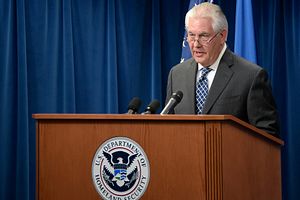Today’s announcement that U.S. President Donald Trump has sacked U.S. Secretary of State Rex Tillerson, in favor of head of the Central Intelligence Agency Mike Pompeo may not come as a surprise to many. There were constant rumors that Tillerson was on the way out; disputes between the former chief executive of ExxonMobil and the president were often in the news.
Their differences over the United States’ Korea policy – or lack thereof – offered a clear example.
Although one feature of Trump’s presidential campaign was his willingness to eventually meet for a hamburger with Kim Jong-un, President Trump’s North Korea vision has been anything but dialogue-focused – until the sudden turn of events last week, that is.
Slapping on sanctions left, right, and center, the president’s hope for North Korea was clear: one punishment after the next would finally make the bad boy of North Korea learn his lesson, and follow the rules of the international game once and for all. Rhetorical claims of “fire and fury” and threats to destroy North Korea all seem contradictory to the president’s recent acceptance of Kim’s offer of dialogue, hailed by South Korean President Moon Jae-in as a “miracle.”
At a rally in Pennsylvania, Trump boasted that, if all goes to plan, his summit with Kim would lead to “the greatest deal for the world.” Yet the man who knows all about the art of the business deal doesn’t seem to know much about diplomatic deals, in particular, the difficulties, trials, and tribulations that working with North Korea can entail. We only have to look at history to see examples of this in action.
Tillerson seemed more aware of the fact that North Korea would not simply being to play by the global rules that it has for so long successfully avoided. The divergence between Trump and Tillerson’s views on the Korea problem became clear following Tillerson’s somewhat controversial comments at an event at the Atlantic Council in December 2017.
His statement that the United States is “ready to talk any time North Korea would like to talk, and we’re ready to have the first meeting without precondition” was not well-received by many, including the Oval Office. The former secretary of state continued to say: “We can talk about the weather if you want … But can we at least sit down and see each other face-to-face, and then we can lay out a map, a road map, of what we might be willing to work towards.”
The acknowledgement of the difficulty of even bringing North Korea to within walking distance of the negotiating table was apparent to Tillerson: this is no ordinary state, and dealing with this state is not as simple as other diplomatic interactions. Indeed, Tillerson’s crucial understanding was that to expect North Korea to come to the negotiating table ready to denuclearize was far from realistic: there is no reason to expect a country that has taken so long to nuclearize and perfect its craft to give up in the blink of an eye.
Such a recognition of this reality – however unpalatable – did not go down well with the Oval Office: in October 2017, Trump dismissed Tillerson’s efforts at diplomacy with the North as “wasting his time.” If back in 2017, Trump and hard-line U.S. officials dismissed Tillerson’s support for dialogue without preconditions – bringing the North to the table as equal counterparts of the United States – as a sign of diplomatic weakness then how ironic that in March 2018, Trump jumped at the offer of dialogue with Kim, with very little of the substance pinned down.
With Tillerson’s exist, the problem of promoting realistic understanding of the North Korean issue looms ever larger over the White House. Dealing with North Korea is not akin to talking to the candidates on “The Apprentice” across the boardroom, or signing a business deal with golf course developers. It is far harder, and the need to learn from Tillerson’s recognition of the complexity of the situation cannot be overemphasized. Otherwise, the meeting of two bombastic leaders, each with competing concerns over status and prestige, is not going to be an easy ride.
The need to act pragmatically with regard to North Korea remains, along with the constant importance of trying to understand what North Korea really wants, behind the façade of emotional and performative diplomacy. The reaction to the proposed Trump-Kim summit has been vociferous, but arguably, the Moon-Kim summit may be just as important, if not more so, in demonstrating with Kim really wants to achieve.
Regardless, the White House would be well advised to take heed of the fact that diplomatic deals are even more of an art form than business deals.
Edward Howell is an Economic and Social Research Council Scholar in International Relations at the University of Oxford.
































